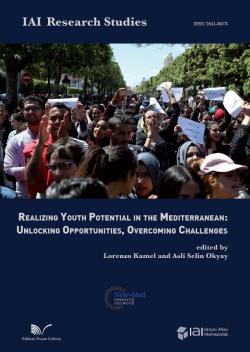Realizing Youth Potential in the Mediterranean: Unlocking Opportunities, Overcoming Challenges
Beyond the narrow focus on security concerns dominating debates on the Middle East and North Africa (MENA), there is a dire need for local perspectives on the many pressing socio-economic and political challenges impacting the “youth” and broader societies in the region. This volume brings together such perspectives offered by eight outstanding young scholars from the region on a broad range of issues: from political activism, to women’s empowerment, from environmental challenges to unemployment, all paying attention to youth-inclusiveness. Their accounts highlight the need for policies that are human-centric and not merely state-centric, and for going beyond reproducing “politics as usual”, and instead responding to the changing problems and aspirations of societies with their younger and older cohorts.
Revised version of papers presented at the New-Med conference entitled “Youth Potential in the Mediterranean. Unlocking Opportunities, Overcoming Challenges”, held in Rome on 7 May 2018 and organized by the Istituto Affari Internazionali (IAI) and the OSCE Secretariat in Vienna, in cooperation with the German Marshall Fund of the United States, the Compagnia di San Paolo International Affairs Programme and the Italian Ministry of Foreign Affairs and International Cooperation.
-
Details
Rome, Nuova Cultura, October 2018, 112 p. -
Issue
2 -
ISBN/ISSN/DOI:
978-88-3365-112-5
List of Contributors, p. 7-8
List of Abbreviations, p. 9-10
Foreword, by Nicolò Russo Perez, p. 11-13
Introduction, by Lorenzo Kamel and Asli Selin Okyay, p. 15-19
1. “Youth” of Syria: An Antithesis to an Authoritarian System of Power, by Bilal Sukkar, p. 21-33
1.1 Deconstructing the concept of “youth”
1.2 Marginalization of a “youth”-driven political alternative
1.3 Civil society: Thriving in the absence of regime hegemony
Conclusion
Policy recommendations
2. The PA’s Security Role and Youth Political Representation as Pathways for a Workable Palestinian National Reconciliation Deal, by Ahmed G.S. Sukker, p. 35-46
2.1 The Palestinian national reconciliation
2.2 Dispute over the PA’s security role
2.3 Grounds for modification of the PA’s security role and professionalization of security forces
2.4 Changing preferences of the youth
2.5 The way forward
3. Contesting Top-down Led Women’s Empowerment: The Case of Saudi Arabia, by Huda Alsahi, p. 47-56
3.1 Assessing recent women’s empowerment reforms
3.2 Contesting women’s empowerment
3.3 Viewing the recent empowerment reforms as enabling factors
4. Democracy in the Making: Youth and Local Governance in Tunisia, by Tasnim Abderrahim, p. 57-69
4.1 Why promote youth participation in local governance?
4.2 Challenges to an active youth engagement in local governance
4.3 Dismantling barriers to youth participation
Conclusions and way forward
5. Escaping Water Stress in the MENA Region, by Abed Al Kareem Yehya, p. 71-86
5.1 Background
5.2 The water-energy-food nexus
5.3 Water issues in Lebanon: Irrigated agriculture and water stress
5.4 Is agriculture the right path for the Bek’aa?
5.5 Can solar energy farming be a feasible substitute to irrigated agriculture?
5.6 What about food security?
5.7 Bottlenecks: Political stability and governance
Conclusions and policy recommendations
6. A Second Resource Curse: Articulating the Consequences of the Looming Resource Crisis in the Middle East and Plotting a Path for Sustainable Development, by Manar Sarie and Ahmad Abdulla, p. 87-99
6.1 Our approach
6.2 The future of MENA
6.3 Potential technological interventions
Conclusions
7. Socially Inclusive Fourth Industrial Revolution: Fostering Youth Employment in the Middle East and North Africa, by Semuhi Sinanoğlu, p. 101-112
7.1 Context
7.2 Policy challenges
7.3 Programme interventions
7.4 Policy/programme recommendations
Policy recommendations



